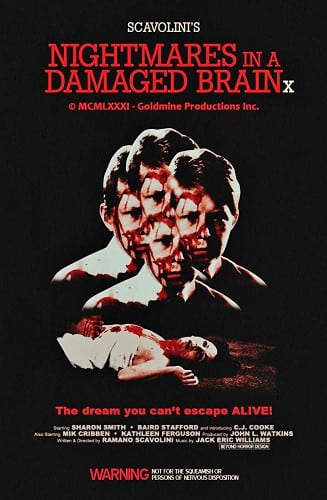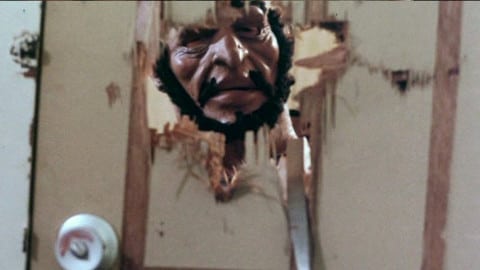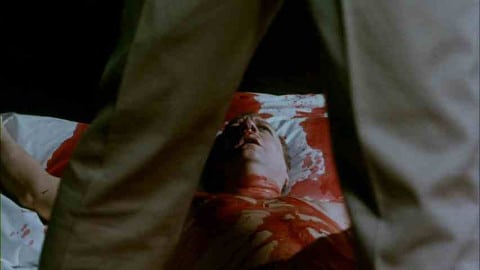Nightmares In A Damaged Brain (1981)
Directed by: Romano Scavolini
Written by: Romano Scavolini
Starring: Baird Stafford, Bob Rosen, C.J. Temper, Sharon Smith
USA
AVAILABLE ON BLU-RAY AND DVD
RUNNING TIME: 99 mins/ 98 mins/95 mins
REVIEWED BY: Dr Lenera, Official HCF Critic
George Tatum has spent several years in a mental institution where he’s been given an experimental drug to try to curb his violent dreams. Released prematurely, he heads for Florida, but still keeps on having recurring nightmares of a nasty incident from his childhood, something which forces him to kill. Then, once in Florida, he proceeds to target a single parent family, plaguing them with prank phone calls and generally lurking around….
Our valued ex-contributor Matt Wavish began, though was sadly unable to complete, going through all the ‘video nasties’, films that were bannned in the UK in 1983, and reviewing them. Over two decades before, I myself began to go through that DPP [Director of Public Prosecutions] list and obtain [oh the days when us older horror fans used to browse the back pages of certain magazines for advertisements saying things like “Rare and uncut horror films for sale, includes all video nasties“] the films, but I didn’t buy them all and Nightmares In A Damaged Brain, despite being very notorious for two reasons which I will mention in the paragraph below, is one of a number of titles I never got to see. I think it was because, as many readers will probably agree, many of the movies on the list just aren’t very good and don’t deserve to have had such a fuss made about them. Writer/director Romano Scavolini’s 1981 slasher could be almost described as what would happen if you crossed Halloween with Maniac. He seems heavily inspired by both. It’s a grim piece of work that certainly doesn’t have the sense of fun that most slashers of the time have, Scavolini being out to disturb. It’s also a very uneven watch. Scavolini seems to have artistic leanings and parts of the film are very well done, but there are also a few laughable moments and scenes which weaken what he’s trying to achieve, while the writing overall is often slapdash, even by the standards of this kind of thing. In terms of gore there are indeed some very extreme bits, though not very many of them.
Scavolini took his inspiration from a newspaper article he read about drug experiments conducted on schizophrenics by the CIA. Originally called Dark Games, it was filmed in New York and several Florida locations including a real asylum. Joel Coen was originally the editor but was fired for unknown reasons. Posters claimed that Tom Savini, whose name had become a major draw with The Burning and The Prowler heavily promoting the fact that he did the effects, also did the honours for this film, but he sued to have his name removed from the posters. He’s always said that he was just a consultant, though he remained credited on some prints. The US version lost around three minutes, not just gore but tiny portions of other scenes, presumably to speed up the pace. The UK cinema release, which had a grisly marketing campaign asking moviegoers to guess the weight of a brain floating in a jar of liquid, had another minute of violence cut, then when it came out on video the distributor David Grant was jailed for 18 months because he put out a version which put back in the minute cut out by the BBFC! That version finally legally came out in the UK in 2000, though only in 2015 could we see the full uncut version – or something close to it. While all the gore is restored, it seems that little parts of some scenes are still AWOL, even from the UK Blu-ray which is 39 seconds longer than the US Blu-ray.
One thing I should say right away is that the sound quality of the UK Blu-ray is really very poor. Some of the dialogue is extremely quiet so you need to turn the volume up, but then you also get some extremely loud moments including some screams that were so noisy that I wondered if my neighbours might be concerned at what I was getting up to in my living room. I very much doubt that all this is because 88 Films have done a bad job with the audio, it’s more than likely that the movie has always sounded like crap and 88 did the best they could with what they had. Anyway, the film sure gets off to a strong start though some may find it hard to tell exactly what’s going on. Our main protagonist has a nightmare where he pulls away his covers to reveal a woman’s severed head at the end of the bed amidst a huge amount of blood. Then we cut to the usual slasher POV camera stalking around outside a house. “I saw somebody looking in the window at us” says the boy inside, after which babysitter goes outside and screams. We see the boy smirk, then we cut back to George, who I presume is just imagining the scene, because when the babysitter [what, you think that merits a ‘spoiler’ warning?!], is killed later on it’s inside the house. Then we see fragments of some S & M bedroom action, a young boy watching, and some spattering blood. This is obviously the traumatic event that haunts George, and we return to it again and again later, in fact it’s seen a bit too often.
Things then settle down as George is released from the asylum he’s spent some time in because according to his doctor he’s now cured. He goes straight to New York’s once-notorious 42nd Street so you just know that you’re going to get a sleazy scene. George has a seizure, foaming horribly at the mouth, whilst getting excited by a phone sex operator who’s is doing naughty things with a dildo. He heads for a house in Florida where quite possibly the events that still trouble him took place, killing a woman along the way. Now the connection between George and this family is obviously intended to be a mystery right until the final scene when it is supposedly revealed, but it’s so obvious quite early on, with rather unsubtle clues, that several synopses of the film reveal it, though I’m not going to be quite that mean. In any case, the film really drags in its mid-section as the family, in particular the poor mother Susan, have to deal with her son C. J. being a cruel sort who likes to pull pranks like pretending he’s been stabbed, causing worried mum to hurry home with her boyfriend, while the police and his doctor are on George’s trail. There’s nothing inherently wrong with a slasher which takes its time, but Scavolini lacks the skill of someone like John Carpenter at doing this kind of thing, though the eventual climax is quite hair-raising, partly because the showdown is between the killer and a small boy, rather than a teenage girl. Talking of Carpenter, his 1978 classic really is pilfered throughout, but especially in the final act where the slaying of a babysitter and her boyfriend even has one of them killed in the same way!
There aren’t many murder scenes, but they are pretty graphic. A hammer death sees the tool smashing bloody holes in the victim’s body several times, while the final, full version of that flashback really is a shockingly nasty tableaux, and certainly looked to me like it could be the work of Savini at his best, though some of the other moments don’t look quite as good. Much more of the film is actually taken up with false scares, George looming into focus just out of shot, and “he’s behind you” moments, Tenebrae‘s “somebody bending over to reveal somebody else standing behind” being used not once but twice. In fact I believe that this film was made before Argento’s 1982 giallo, so maybe it deserves more credit for introducing the thereafter often-copied gimmick. Scavolini is fairly good at the stalk scenes, and often uses slightly avant garde, very early 1970’s-style cutting between two different scenes, though he’s not so good at the slower moments, which are also full of absurdities like the police questioning a child at a crime scene. And it appears that, while he was incarcerated, the doctors never bothered to investigate whether George’s traumatic dreams actually happened. Very few characters in the film actually behave normally. I was especially amused by Susan, who just seems to constantly shriek, often for no apparent reason.
Our killer, George Tatum, a touch more debonair than your average screen murderer of the time, does manage to be a little bit sympathetic, unlike say Joe Spinnell’s unpleasant loony in Maniac, though actor Baird Stafford, who’s clearly a much better actor than most of those around him who were mainly members of the crew, is often restricted to giving lingering looks at the camera. The old man mask he wears towards the end is quite an effective choice though. I wish that the script had gone into more detail as to exactly why seeing what he did drove him mad, but then you shouldn’t really expect complexity. Still, it does often feel like Scavolini, whose filmography otherwise seems to consist of very obscure movies indeed, did set out to make a genuinely good film, one with a bit more depth than you would normally get in something like this, but the cliches of the slasher movie got in the way and pushed out much of the really interesting stuff, possibly something that was unavoidable for commercial considerations. Some promising ideas, such as for example George’s relationship with C. J, who seems to be turning into a bit of a psychopath himself, are suggested but not really followed through. And I do think that shaving off 10 or so minutes from its 99 minute running time, removing the goofier moments and worst bits of acting, and tightening some scenes, would improve the result. Was it worth all the fuss made in the 1980’s? Well, I can totally see how the BBFC would have got their knickers in a twist about the linking of sex with violence in George’s mind. Seen today, Nightmares In A Damaged Brain comes across as sometimes rather silly, but there are certainly times when it really does become the really dark, grim piece that it was intended to be. And you’ll sure remember it for some time – well, at least the ending!
Rating: 














Be the first to comment